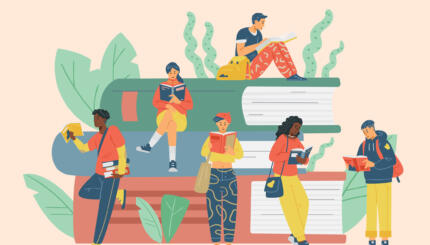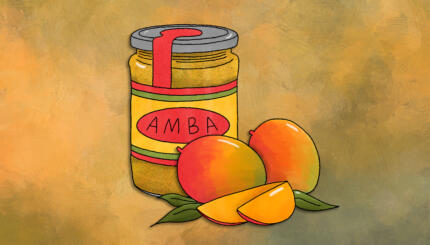It was Fall the first time I asked my mom if I looked handsome, about halfway through my process of becoming Jewish. It’s hard to forget a moment like that—something shifts. I had my chin up high, my button-down shirt layered under a leather jacket. I wasn’t sold on the word “handsome” quite yet, wasn’t sure that a word like that could belong on my body, but I wanted to try. Uncharted territory, no longer pretty but something else, unknown. There was a point where “Jew” felt that way as well.
If you have never experienced dysphoria, there is no wording to replicate the experience. Somedays I want to rip off my skin. Somedays I do. Somedays I wonder whose body I’m walking around in, anyway. Somedays I don’t think about it at all.
Not all nonbinary people are trans, but I am. This confuses those who believe gender is a road—it’s really more of a roundabout. Am I headed in any real direction? Not particularly. There is a part of me that is always in flux, that refuses stasis. I get dizzy sometimes making all those loops. But somedays, when the sun peeks out, I can roll down my windows, loll my head out the window, and just ride.
The day of my immersion at Mayyim Hayyim was all sunshine, literally and metaphorically. I had my mom and my three best friends with me (so my four best friends, really), and I could hardly speak for fear that none of it was really happening. Even so, I didn’t carry the regular tension in my shoulders that I do in predominantly cisgender spaces. My Mikveh Guide, Naomi, confirmed my pronouns with me when we met—and just like that, I had no fear that someone would slip and remove me from my own body.
After I met with my beit din, the council of three rabbis who deem a candidate ready to immerse, I was lead into a room to prepare. I removed my clothes and piercings, washed my hair, studied my face in the mirror as I spoke with God, and cried. Hineini, I said. Here I am.
It is difficult to explain the way that everything faded away stepping to the side of the ritual pool. My acne scars. The way fat collects on my hips. The angular jut of my foot bones. It was still my body; in some ways, it was more of my body than it had ever been, free of any moral judgments. A vessel.
Perhaps it’s too simple to call the act vulnerable. The vulnerability extends beyond me and my Guide, who stayed in the room to make sure that I immersed in the water completely three times, beyond me and my loved ones standing outside the doors. It’s the vulnerability I feel standing in front of the ark on Yom Kippur, the Day of Atonement; the vulnerability I feel when I talk to God before bed. To offer up the whole of myself—no piercings, no polish—and to be received in turn. It never does get old, that feeling of walking into open arms. The water, the warmest embrace I have ever felt, calling me home.
Naming is a sacred act. My name changes in and outside of me with the turning of the leaves. Around and around I go. Every year, a new, imperceptible shift toward something else, something true. To be nonbinary means to be malleable. My Hebrew name is Chaya Yehuda, Chaya meaning “life” and Yehuda meaning “thanksgiving” or “praise.” Having both traditionally feminine and masculine Hebrew names also allows me to bring my gender fully into the conversation of my Judaism. But no matter what I call myself, Judaism has given me the space to realize I am more than one thing, and that is miraculous and not to be forgotten.
And as I finished the Shehecheyanu prayer thanking God for letting me reach this moment and the singing rang out, I let my tears slip as I floated up onto my back, weightless and grateful, a Jew at last.
Pictured: Rabbi Andy Vogel, Al’s friend Carl Lavigne, Al’s mother Christine Reitzel, Al, Rabbi Shoshana Meira Friedman, Rabbi Becky Silverstein, and Al’s friends Brad Trumpfheller and Kayla Coakley.
“Ode to Spontaneous Selves” is reprinted with permission from the Mayyim Hayyim blog.
Boston-based Al Reitz earned their BFA from Emerson College and was a Lambda Literary Fellow for Emerging LGBTQ Voices in 2017. They are the author of the short story collection Middlelands (Wilde Press, 2017), and their work can be found in the Emerson Review and Berkeley Fiction Review.


